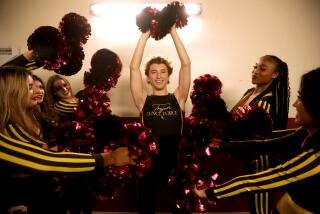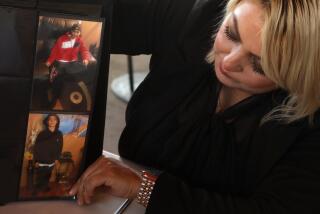MARCO
- Share via
SANTA ANA — Delia Jaramillo agonizes about her son. She fears that the money she occasionally finds in Marco Aguilera’s pockets--hidden deep inside the baggy pants she hates and will not buy him--might come from selling drugs.
She knows he regularly skips school and wonders where he spends his days. She frets because he stays out too late and on some nights never comes home at all. She has threatened to send him to a Catholic school in Mexico, where her brother, a priest, is a teacher.
“I worry for him--too much,” Jaramillo says. “He says he’s going to change, but the next day he does the same thing. I don’t believe him anymore.”
At 16, Marco is confused and afraid himself. He worries about the future, whether to stay in school or drop out and find a job. He fears sometimes that his life will end, as it began, here in a city that symbolizes danger and, ultimately, failure to him.
“I’m OK,” he says one recent afternoon, sounding unsure. “I just feel kind of bad right now.” But then, seated near the table his mother has just left at a busy McDonald’s restaurant, he covers his face with his hands, trying to hide his tears from the crowd.
A teen with close-cropped dark hair, a quiet voice and low-key manner, Marco acknowledges in his own way that he is slipping down a slope that is becoming more and more difficult to scale.
Since January, he has missed more than 40 class periods at Century High School and is in danger of failing several courses, Marco and his mother say. Some days, he stays home because he feels tired or ill; other times, he admits, he just doesn’t feel like going.
Early this month, Marco was suspended for three days after he fought with a boy from his wrestling class. It could have been worse: Without knowing who it was, Marco aimed a blow at a staff member who grabbed him from behind as he broke up the fight. But Marco never threw the punch.
Lately, Marco has even begun to question his involvement in the Saint Joseph Ballet, an anchor in his life for more than five years.
“I don’t feel comfortable there right now,” he says. But part of his unease, he concedes, might stem from the fact that a girl he likes, another dancer, has lately turned cool.
One thing he is sure of, he says: Despite his mother’s fears, he does not sell drugs. The money in his pockets is unspent bus fare. And he does not take drugs either, he says.
At least not now.
About two years ago, when he was in seventh grade at Sierra Intermediate School, Marco says he regularly used his lunch money to buy drugs. He used speed or cocaine, generally bought from another middle school classmate, he says.
His friends at the time were users. Marco says it didn’t take much to persuade him to try it too. He missed classes, hanging out at friends’ homes, smoking speed-laced joints in alleys near the school.
As far as he knows, neither his mother nor his teachers nor the ballet staff ever suspected his drug use at the time. But there was a young woman who worked in the school’s office, a kind-faced woman whose name he doesn’t recall, who could tell something was wrong.
“She knew I was in trouble,” Marco says. She urged him to get into sports, telling him it would help resolve his truancy problems. He began to swim, ride his bike and play basketball, and he managed to stop taking drugs, he says.
But there was an episode at the ballet earlier this year, when Beth Burns, founder of the ballet program, told him he was displaying symptoms of drug use: glazed eyes, inability to concentrate and loud, inappropriate laughter.
Burns took Marco into her office one day and talked to him, raising her concerns but never asking him to confirm them. She also temporarily banned one of his friends, who is not a ballet member, from spending time there, in the belief that the youth might be helping Marco obtain drugs.
Both have abided by the ruling: Marco has displayed no signs of drug use since then, and his friend, after staying away for about a month, has recently been allowed to return to the ballet studio.
“In seventh and eighth grade, I was speeding and taking cocaine and nobody knew,” he says. “Now I’m not taking them and they think I am.”
Marco often shrugs off his troubles, past and present.
His neighborhood, just blocks from the ballet in central Santa Ana, is one of the city’s most dangerous. Marco has had more than a dozen bikes stolen. Once, he says, he was threatened and forced to give up his bike at knifepoint. The robbers cut him before they fled, leaving a scar on his arm.
Gang members, including some friends, loiter outside the entrance to his apartment complex. They have tried to persuade him to join them, and he has been tempted.
“They say you’ll have protection, that you’ll have more friends if you’re in the gang,” he says. “They were friends of mine. They used to be good friends. But they just try to get you in by lying. I’m not going to do it.”
When he was as young as 3 years old, Marco would intervene in frequent, violent confrontations between his parents, his mother says, trying to protect her from his father. The blows sometimes landed on him as well.
Several times, his father threw him across a room, Jaramillo said. Once, the back of his head struck a wall so hard that it caused permanent damage. A visible, occasionally painful bump remains.
Marco struggled for his first few years in school, unable to concentrate. He repeated two grades. His parents finally split when he was 7 and his father soon dropped out of his life. Both his schoolwork and home life improved.
Jaramillo works two jobs: full time at a Santa Ana fast-food restaurant and part time at a dry cleaner in Irvine. Marco’s stepfather is a construction laborer and fixes cars for extra money. The couple share a two-bedroom apartment with Marco, his younger sisters Nereyda and Juanita, and two of his uncles.
Like so many of the other dancers, Marco escapes his bleak environment by hanging around the ballet. One of a handful of older boys in the program, he is usually at the center of a circle of teenage girls. But he is popular with boys as well, his longevity at the ballet affording him a certain status.
One day recently, Marco ate a restaurant breakfast of pancakes and sausage with Perri Darweesh, the ballet’s program manager, before she drove him to a doctor’s appointment. The bump on his head was throbbing when he lifted weights and he wanted to have it checked.
She looked at him with affection, then reached out and ran her hand through his hair. “You are just so cool, Marco,” Darweesh said. “You’re like one of the oldest guys staying in the ballet. You guys are creating a legacy, you know.”
But Marco says he’s not sure how long he can stay at Saint Joseph. He wonders whether he should quit after this week’s performances and get a job to help his family. His mother says yes; the family needs the help.
“I think I need to do it,” he says. “But I’m not sure right now. I don’t know.”
More to Read
Go beyond the scoreboard
Get the latest on L.A.'s teams in the daily Sports Report newsletter.
You may occasionally receive promotional content from the Los Angeles Times.










